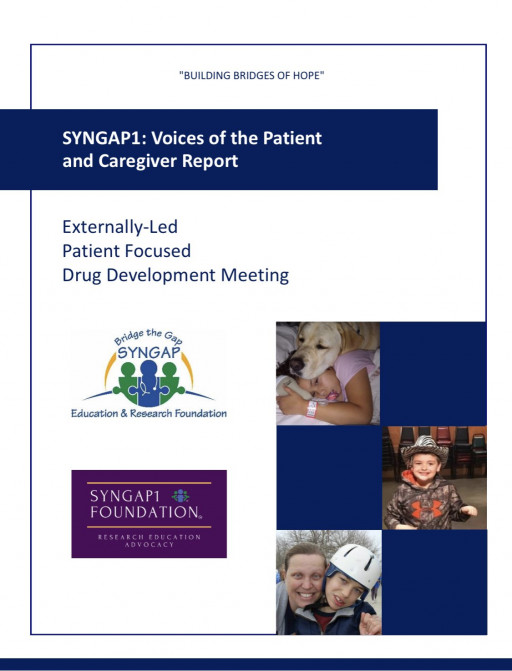WASHINGTON, April 17, 2023 (Newswire.com) - The SYNGAP1 Foundation has released its SYNGAP1: Voice of the Patient and Caregiver Report, a landmark publication based on its Nov. 19, 2020, externally led patient-focused drug development (EL-PFDD) meeting. Families and caregivers living with SYNGAP1 participated via Zoom, email, and calling in, sharing stories and input captured in the Voice of the Patient Report. It will provide the FDA and the biopharmaceutical industry with deep insights into how SYNGAP1-related disorders affect individuals' health, daily lives, and well-being. Individuals and families living with SYNGAP1-related conditions shared with U.S. Food and Drug Administration (FDA) representatives and other stakeholders about how the neurodevelopmental disorder affects symptoms and hopes for future treatments to improve quality of life.
The SYNGAP1 gene provides instructions for making a protein called SynGAP, which plays an essential role in nerve cells in the brain. SYNGAP1 mutations' prevalence is 2%-4% of sporadic (non-Inherited) cases of intellectual disability worldwide. Five out of 500 persons diagnosed with epileptic encephalopathy have a SYNGAP1 mutation. The frequency of these mutations is like that of Fragile X Syndrome, the most common inherited cause of Intellectual Disability ("ID worldwide"). Gene Reviews
The report describes the array of clinical symptoms suffered by individuals with SYNGAP1 mutations, a few being the most common, such as developmental delay, intellectual disability, epilepsies, speech delay, impaired communication, and sensory processing disorder. One individual explained a few of her symptoms living with SYNGAP1, "I'm obsessed with making lists and organizing, and I have sensory issues related to noise and certain textures." Another mother described her concern for her toddler: "He didn't take his first steps until he was almost two, and shortly before his second birthday, he began walking independently. His gross motor skills were delayed, and he had trouble doing simple tasks, such as feeding himself." The average age for walking is 26 months (range: 10.5 months to 5 years). Language is generally impaired; a third of individuals aged five years or more remain nonverbal. In those who are verbal, language development ranges from the use of single words only to four-to-five-word sentences.
In addition, other symptoms observed in patients include inattention, impulsivity, self-directed and other-directed aggressive behavior, elevated pain threshold, hyperacusis, and sleep disorders, which also include autism spectrum disorders (ASD). Autism diagnosis may be as high as 50% of SYNGAP1 patients, including stereotypic behaviors such as hand flapping, obsessions with objects, and poor social development.
Short of a cure, families consistently stated that the top three symptoms as the target of a new therapy would be the ability to control seizures, improved behavioral control, and improved ability to communicate. Many people also indicated help with motor skills and self-care, halting disease progression, improved social interactions, and improved cognitive ability. Being understood is a top desire of caregivers and families. The common theme in comments shared during the meeting is that families and caregivers living with SYNGAP1-related disorders are willing to tolerate a higher degree of uncertainty about the effectiveness of a new drug, given the dire, unmet need they currently experience. A mother of a child expressed, "I hope that something comes out to target the root of the problem, which will alleviate many of the symptoms. We desperately need something, because the side effects often outweigh the benefits of many meds." Another testified, "Since this is so incapacitating, even invasive therapy delivery procedures will be welcome."
Contact Information:Monica Dudley-Weldon
President & Founder, SYNGAP1 Foundation
[email protected]
2403470302
Matt Toresco
Chief Operations Officer/ SYNGAP1 Foundation
[email protected]
Original Source: Landmark Report Captures Compelling Testimony by Families and Caregivers About Living with SYNGAP1-related Disorders and Urgent Need for Treatments




